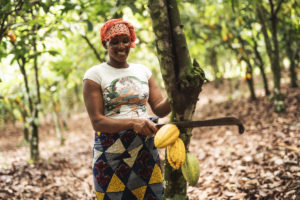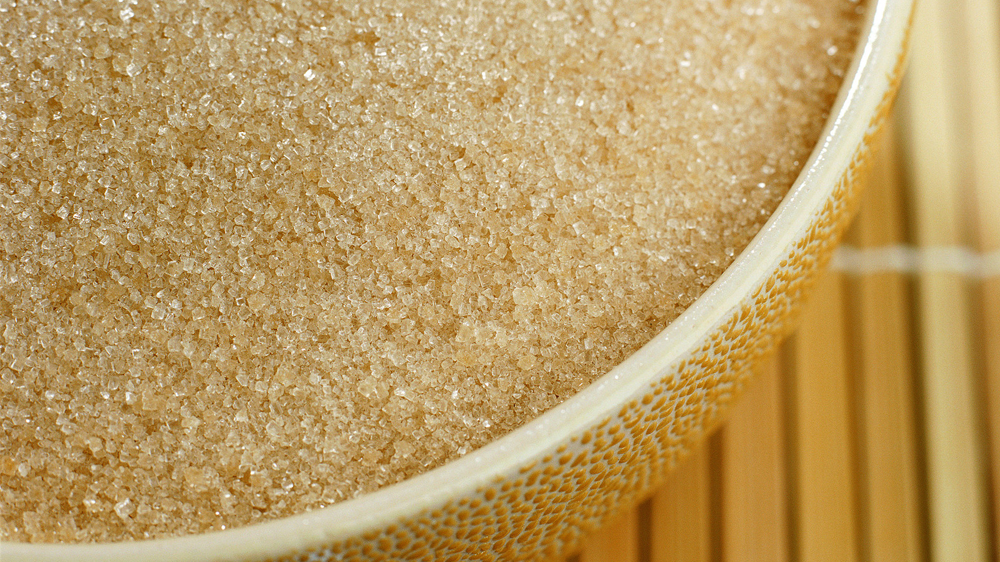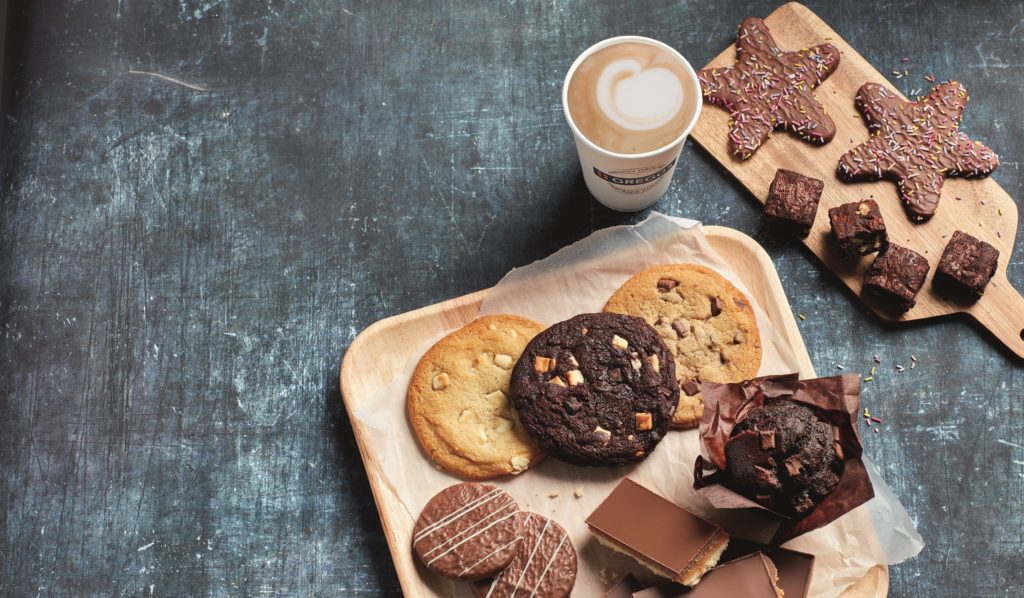Greggs are a long-standing and unique partner with Fairtrade in food-on-the-go retail.
Greggs and Fairtrade: a success story on-the-go
The partnership started in 2006 when Greggs introduced Fairtrade coffee. It has since gone from strength to strength.
Read the interview with Malcolm Copland, Greggs’ commercial director.
Greggs’ Fairtrade commitments now include:
- Coffee beans
- Apple juice
- Orange juice
- Sugar sticks
- Sugar syrup
- Hot chocolate
- Black tea
- Mint tea
- Bananas.
Over the last 17 years, Greggs have generated over £6.1 million in Fairtrade Premium for farmers and workers across their supply chains, from sales of coffee, tea, hot chocolate, fruit juice, sugar, cookies, and bananas. In 2021 alone, Greggs generated £1m in Fairtrade Premium for farmers and workers.
The Greggs Pledge

Greggs’ commitment in 2021 to sourcing its chocolate from Fairtrade forms part of the company’s sustainability plan, The Greggs Pledge. This pledge supports Greggs’ commitment to sourcing sustainably and having a robust Responsible Sourcing Strategy in place by 2025.
Start a conversation. They’re nice people at Fairtrade.
Malcolm Copland, Greggs’ Commercial Director
The pledge, launched in February 2021, sets out the company’s 10 commitments to help make the world a better place by 2025. These commitments are aligned with the ambitions of the United Nations Sustainable Development Goals (SDGs).
This has a hugely positive impact for cocoa farmers as it supports improved household income, helps track climate change, and strengthens women’s empowerment.
Interview with Malcolm Copland, Commercial Director at Greggs
Malcolm Copland, Commercial Director at Greggs, spoke to Fairtrade Foundation’s Will Browning, Head of Partnership Development, about the success of the partnership.
Will: Can you tell us how things have been for Greggs during the pandemic and about your decision to go ahead with your commitment despite the bleak environment?
Malcolm: When it came to the values of the business, protecting our people was key, but we also wanted to rapidly progress with some of the plans we had in place and the work that we were doing with Fairtrade. It was important for us to accelerate the plans into chocolate. We were delighted to be able to do that for our supplier partners.
Will: Why did Greggs first start working with Fairtrade?
Malcolm: It was very much about our values, particularly around providing quality products and doing the right thing as a business. At the time, we were entering into the coffee market and we wanted to ensure that we could deliver something back in the supply chain. Because it was an independent certificate, Fairtrade enabled us to demonstrate that we were treating farmers fairly. And that’s why the certification was very important to us; because it reflected the values of the Greggs business, developed 86 years ago.
Through the Greggs Foundation with our breakfast clubs and what we do within the communities where we operate in the United Kingdom, there was a great synergy.
Will: What you are most proud of since you first started out on your Fairtrade journey?
Malcolm: I’m proud of being Fairtrade’s strategic partner for food-on-the-go when it comes to Fairtrade Fortnight. I’m also proud of working on collaborative marketing campaigns to highlight the benefits of Fairtrade to our customers and communities.
The things that personally have touched me, are that we’ve had farmers coming into Greggs. They have met our retail teams and our Board.
I remember a couple of female farmers talking about what Fairtrade has meant to their communities and to them personally – in terms of the social equity. And how it has transformed their lives and the lives of their families. That was important to us to hear first-hand. And I think has really impacted us very strongly in terms of doing more with Fairtrade across more categories as well.
It makes the hairs at the back of my neck stand up thinking of how impactful it was and how it touched so many people.
Malcolm Copland
The second highlight was when our retail team went to meet some of the farmers. We then brought the story back into the Greggs annual conference. Seeing on the big screen the story of the team meeting the farmers and listening to what Fairtrade meant to them. I really don’t think there was a dry eye in the house.
And to this day it makes the hairs at the back of my neck stand up thinking of how impactful it was and how it touched so many people. These things have made such a big difference in terms of making it real for people.
These things have made such a big difference in terms of making it real for people.
Will: In 2021, Greggs launched The Greggs Pledge, which includes 10 commitments to make the world a better place by 2025 and beyond. Which of these commitments does Greggs’ partnership with Fairtrade contribute to?

Malcolm: The pledge is very much about our commitment to the planet and communities. We publish our progress against our 10 commitments every year. Fairtrade, we think is key to a number of them.
We are committed to growing breakfast clubs and supporting our communities.
Equally, on what Fairtrade does – our coffee commitment means farmers are better equipped to put food on the table for their families.
The commitment to reducing food waste is another. Working with our partners across the Fairtrade commodities is key for us in terms of efficient supply chains and ensuring that there’s less wastage.
Our commitment to carbon neutral is key and we are collaborating with all of our partners on that.
And I think that when we look at building shops in the future, we want our customers to be immersed as well. The shops of the future will enable us to communicate more about Fairtrade.
Finally, embracing diversity. We talked already about social equity, the work we’re doing with female farmers, on empowerment and education. That for us is very, very important within Greggs and in our supply chain.
All of this goes into our commitment on sustainable procurement as well.
Will: What would you like to say to farmers in your Fairtrade supply chains?
Malcolm: First a thank you. Thank you for the dedication they have to their profession. They’re obviously working very, very hard to develop themselves and to reinvest back into the communities and back into the profession as well.
Higher farmer standards are fantastic, it means a better-quality product for us. And it also means that we have a better understanding of the supply chain in terms of our carbon footprint.
Their hard work is very much appreciated.
Will: How would you like to see the partnership with Fairtrade evolve in the future?
Malcolm: Both of our strategies are embracing initiatives on specific themes such as climate, social equity, right to livelihood – which can strengthen the brands’ sustainable sourcing goals.
Also to continue to develop a wider impact to ensure a just transition to a low carbon society across our complete supply chain. And making sure the farmers and growers associated are involved in carbon reduction and remain resilient to climate change.
Will: And finally, what would you like to say to the rest of your industry about Fairtrade and working with Fairtrade?
Malcolm: I think that it would be a great thing to start the conversation with Fairtrade. To really understand the certification and the process. And beyond the certification, in terms of the strategy of where Fairtrade is going beyond 2025 and how that that can support them in their journey, and their strategy.
So, start a conversation. They are nice people at Fairtrade.
Article correct as of July 2022.
Next up

Tate & Lyle: Fighting child labour with Fairtrade
Get in touch
Enquiries
This page is currently under maintenance.
We apologise for any inconvenience caused.
